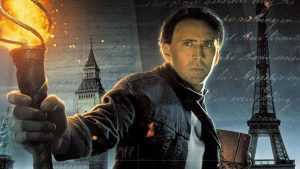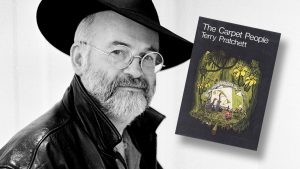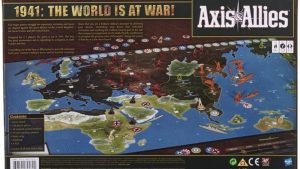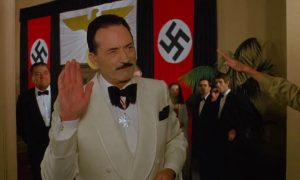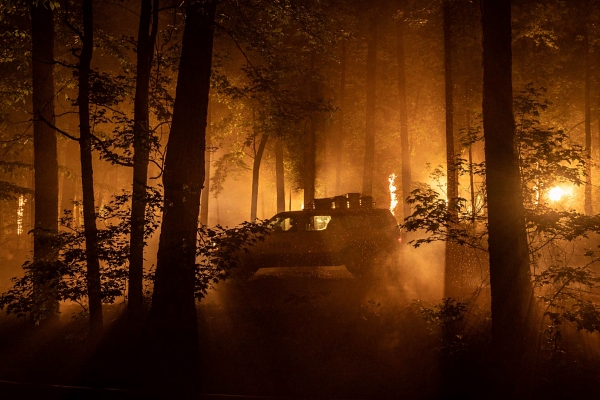
Non-American filmmakers tend to produce the most unflinching movies about American sociopolitical horror. 12 Years a Slave, from British filmmaker Steve McQueen, is a powerful example that confronts America’s great shame with startling sobriety; as is Canadian director Denis Villeneuve’s Sicario, a gritty, though stunningly-mounted, look at American law enforcement on the Southern border. Even Nomadland, from Chinese-born auteur Chloé Zhao, provided one of the better modern-day examples of American economic unraveling in the gig economy era. With Civil War, English writer-director Alex Garland tries to enter the conversation to mixed results. His film is at once a potent reckoning with the United States’ overheated national temperature that measures tense war movie thrills with the artistry of an A24 film, but with an oddly apolitical shape. His film, more a tribute to the bravado of war journalists than an actual attempt to remark on contemporary American division, seems to lack any discerning political leaning or astute observation to justify its American setting beyond showcasing how truly horrifying a civil war unfolding on home turf would be.
Some being less generous to Garland’s work may call the movie cowardly in its refusal to draw correlations to modern American political vitriol and the rise of Trumpism, and they wouldn’t necessarily be wrong. Though meant to provoke, Garland’s film serves as more of a universal cautionary tale about civil war than it does as an actual observation of American circumstance. This really could be set in Canada, Mexico, or any random NATO country really and all that would change is the window dressings. If that feels exploitative in some capacity, channeling an uneasy American political reality for maximum commercial appeal, critics could pile that criticism at Garland’s feet and also not be wrong.
By not addressing any correlation between actual American sociopolitical tensions and the events in the film as well as using actual conflict footage from known American fascists, the backdrop of Garland’s film could be accused of both-sides-ing the underlying issues. Again, this doesn’t play a central role in the film but Garland decided to wade into the territory nonetheless so his work must be held responsible both for what it says and what it does not say. Despite these realities, Civil War remains a visceral, urgent, and alarming dystopian vision of conflicting ideologies boiling over to realpolitik and violence come home to roost.
Kristen Dunst is Lee, a veteran war journalist whose years photographing conflict has left a map of callus and trauma irrevocably etched on her face. This is someone who has seen firsthand the dregs of humanity at odds; witness to men burned alive, civilians blown to pieces, soldiers dismembered. Alongside her journo partner Joel (Wagner Moura), Lee heads to the front lines of the American conflict in Washington DC, chartering a road trip through the wreckage of a war-torn America with a pair of unlikely tagalongs in aspiring journalist Jessie (Callie Spaeny) and old timer Sammy (Stephen McKinley Henderson). As the carload of press make their way from New York to DC, zigzagging through Baltimore, West Virginia, and South Carolina, various skirmishes sharpen the characters’ loyalty, integrity, and ambition.
Dunst offers pathos and gravitas in the lead role. Hardened by atrocities, and carved out by her experience within them, Lee is a living vestibule of human carnage: a poignant symbol of human suffering. Dunst’s haunted, physically-commanding turn infuses the character with conviction and anguish. Her unflinching tenacity is complicated by Jessie’s enthusiastic inexperience. From the get go, Lee rebukes the addition, noting that she’s not ready for what’s in store. Especially so considering that at the capital, members of the press are allegedly shot on sight. As they drive deeper into the heart of the American conflict, Lee begins to questions the value of her work. If the pursuit of wartime journalism is to send home a warning, where is the value in a warning left unheeded?
Relative newcomer Spaeny, who played the titular character in Sofia Coppola’s Priscilla, is the audience cipher, thrown into the terror of warfare, equally horrified by and addicted to brutality. After a particularly harrowing encounter with American troops, she admits, “I’ve never been so scared in my life. But I’ve never felt so alive.” Spaeny does the character justice, balancing Jessie as a liability against her almost weaponized sense of purpose and ambition. Henderson is the beating heart of the film, the most recognizably human of the bunch, while Moura offers a head-turning performance as an affable journalist with at times questionable motives. But it’s Jesse Plemons in a short-lived cameo who most effectively ratchets the tension to the film’s highest heights.
As the losses pile up, Civil War leans into what it actually is: a war movie. Accompanied by roaring sound design (seeing this in a theater equipped to deliver the full power of Civil War’s blaring soundscape is essential) and unusual needle drops, the effect is equally tension-building and upsetting. One is left to wonder how the production design team assembled many of the scenes, from a downed transport helicopter in front of a shuttered Macy’s to what seems to be a fully reconstructed White House. Though he’s hinted at retiring the director’s mantle, Garland actually directs the hell out of Civil War, using unusual framing and contemplative, stylistic choices to find the artistry amongst the horror. In fact, his direction here much outpaces his work as a writer, the area where Civil War lacks most. As a purely sensory experience, it’s up there with the most arresting films of the year. Too bad then that it’s rather toothless as political commentary.
CONCLUSION: Alex Garland has promised an intentionally provocative film that lacks discernible conviction with ‘Civil War’. Though the writing isn’t as sharp as it could have been, the film is nonetheless a staggering and genuinely unsetting depiction of a country torn apart. The sound design and direction are the true stars, though Kirsten Dunst puts in some of the strongest work of her career.
B
For other reviews, interviews, and featured articles, be sure to:
Follow Silver Screen Riot on Facebook
Follow Silver Screen Riot on Twitter
Follow Silver Screen Riot on Instagram
The post ‘CIVIL WAR’ Evokes the Nightmare of a Truly Divided Nation, Sans Commentary appeared first on Silver Screen Riot.
